- Home
- Hunter S. Thompson
The Great Shark Hunt: Strange Tales From a Strange Time Page 9
The Great Shark Hunt: Strange Tales From a Strange Time Read online
Page 9
There was not much to do on the bus except drink, smoke and maintain a keen ear on the babble of conversations behind me for any talk that might signal the presence of some late-blooming Viking fan with money to waste. It is hard to stay calm and casual in a crowd of potential bettors when you feel absolutely certain of winning any bet you can make. At that point, anybody with even a hint of partisan enthusiasm in his voice becomes a possible mark -- a doomed and ignorant creature to be lured, as carefully as possible, into some disastrous last-minute wager that could cost him every dollar he owns.
There is no room for mercy or the milk of human kindness in football betting-- at least not when you're prepared to get up on the edge with every dollar you own. One-on-one betting is a lot more interesting than dealing with bookies, because it involves strong elements of personality and psychic leverage. Betting against the point spread is a relatively mechanical trip, but betting against another individual can be very complex, if you're serious about it -- because you want to know, for starters, whether you're betting against a fool or a wizard, or maybe against somebody who's just playing the fool.
Making a large bet on a bus full of sportswriters on the way to the Super Bowl, for instance, can be a very dangerous thing; because you might be dealing with somebody who was in the same fraternity at Penn State with one of the team doctors, and who learned the night before -- while drinking heavily with his old buddy -- that the quarterback you're basing your bet on has four cracked ribs and can barely raise his passing arm to shoulder level.
Situations like these are not common. Unreported injuries can lead to heavy fines against any team that fails to report one -- especially in a Super Bowl -- but what is a $10,000 fine, compared to the amount of money that kind of crucial knowledge is worth against a big-time bookie?
The other side of that coin is a situation where a shrewd coach turns the League's "report all injuries" rule into a psychological advantage for his own team -- and coincidentally for any bettor who knows what's happening -- by scrupulously reporting an injury to a star player just before a big game, then calling a press conference to explain that the just-reported injury is of such a nature -- a pulled muscle, for instance -- that it might or might not heal entirely by game time.
This was what happened in Houston with the Dolphins' Paul Warfield, widely regarded as "the most dangerous pass receiver in pro football." Warfield is a game-breaker, a man who commands double-coverage at all times because of his antelope running style, twin magnets for hands, and a weird kind of adrenaline instinct that feeds on tension and high pressure. There is no more beautiful sight in football than watching Paul Warfield float out of the backfield on a sort of angle-streak pattern right into the heart of a "perfect" zone defense and take a softly thrown pass on his hip, without even seeming to notice the arrival of the ball, and then float another 60 yards into the end zone, with none of the frustrated defensive backs ever touching him.
There is an eerie kind of certainty about Warfield's style that is far more demoralizing than just another six points on the Scoreboard. About half the time he looks bored and lazy -- but even the best pass defenders in the league know, in some nervous corner of their hearts, that when the deal goes down Warfield is capable of streaking right past them like they didn't exist. . .
Unless he's hurt; playing with some kind of injury that might or might not be serious enough to either slow him down or gimp the fiendish concentration that makes him so dangerous. . . and this was the possibility that Dolphin coach Don Shula raised on Wednesday when he announced that Warfield had pulled a leg muscle in practice that afternoon and might not play on Sunday.
This news caused instant action in gambling circles. Even big-time bookies, whose underground information on these things is usually as good as Pete Rozelle's, took Shula's announcement seriously enough to cut the spread down from seven to six-- a decision worth many millions of betting dollars if the game turned out to be close.
Even the rumor of an injury to Warfield was worth one point (and even two, with some bookies I was never able to locate). . . and if Shula had announced on Saturday that Paul was definitely not going to play, the spread would probably have dropped to four, or even three. . . Because the guaranteed absence of Warfield would have taken a great psychological load off the minds of Minnesota's defensive backs.
Without the ever-present likelihood of a game-breaking "bomb" at any moment, they could focus down much tighter on stopping Miami's brutal running game -- which eventually destroyed them, just as it had destroyed Oakland's nut-cutting defense two weeks earlier, and one of the main reasons why the Vikings failed to stop the Dolphins on the ground was the constant presence of Paul Warfield in his customary wide-receiver's spot.
He played almost the whole game, never showing any sign of injury; and although he caught only one pass, he neutralized two Minnesota defensive backs on every play. . . and two extra tacklers on the line of scrimmage might have made a hell of a difference in that embarrassingly decisive first quarter when Miami twice drove what might as well have been the whole length of the field to score 14 quick points and crack the Vikings' confidence just as harshly as they had cracked the Redskins out in Los Angeles a year earlier.
It is hard to say, even now, exactly why I was so certain of an easy Dolphin victory. The only reason I didn't get extremely rich on the game was my inability to overcome the logistical problems of betting heavily, on credit, by means of frantic long-distance phone calls from a hotel room in Houston. None of the people I met in that violent, water-logged town were inclined to introduce me to a reliable bookmaker -- and the people I called on both coasts, several hours before the game on Sunday morning, seemed unnaturally nervous when I asked them to use their own credit to guarantee my bets with their local bookies.
Looking back on it now, after talking with some of these people and cursing them savagely, I see that the problem had something to do with my frenzied speech-pattern that morning. I was still in the grip of whatever fiery syndrome had caused me to deliver that sermon off the balcony a few hours earlier -- and the hint of mad tremor in my voice, despite my attempts to disguise it, was apparently communicated very clearly to all those I spoke with on the long-distance telephone.
How long, O lord, how long? This is the second year in a row that I have gone to the Super Bowl and been absolutely certain -- at least 48 hours before gametime -- of the outcome. It is also the second year in a row that I have failed to capitalize, financially, on this certainty. Last year, betting mainly with wealthy cocaine addicts, I switched all my bets from Washington to Miami on Friday night -- and in the resulting confusion my net winnings were almost entirely canceled by widespread rancor and personal bitterness.
This year, in order to side-step that problem, I waited until the last moment to make my bets -- despite the fact that I knew the Vikings were doomed after watching them perform for the press at their star-crossed practice field on Monday afternoon before the game. It was clear, even then, that they were spooked and very uncertain about what they were getting into -- but it was not until I drove about 20 miles around the beltway to the other side of town for a look at the Dolphins that I knew, for sure, how to bet.
There are a lot of factors intrinsic to the nature of the Super Bowl that make it far more predictable than regular season games, or even playoffs -- but they are not the kind of factors that can be sensed or understood at a distance of 2000 or even 20 miles, on the basis of any wisdom or information that filters out from the site through the rose-colored booze-bent media-filter that passes for "world-wide coverage" at these spectacles.
There is a progression of understanding vis-a-vis pro football that varies drastically with the factor of distance -- physical, emotional, intellectual and every other way. . . Which is exactly the way it should be, in the eyes of the amazingly small number of people who own and control the game, because it is this finely managed distance factor that accounts for the high-profit mystique that bl
ew the sacred institution of baseball off its "national pastime" pedestal in less than 15 years.
There were other reasons for baseball's precipitous loss of popularity among everybody except old men and middle-aged sportswriters between 1959 and now -- just as there will be a variety of reasons to explain the certain decline of pro football between now and 1984 -- but if sporting historians ever look back on all this and try to explain it, there will be no avoiding the argument that pro football's meteoric success in the 1960's was directly attributable to its early marriage with network TV and a huge, coast-to-coast audience of armchair fans who "grew up" -- in terms of their personal relationships to The Game -- with the idea that pro football was something that happened every Sunday on the tube. The notion of driving eight miles along a crowded freeway and then paying $3 to park the car in order to pay another $10 to watch the game from the vantage point of a damp redwood bench 55 rows above the 19-yard line in a crowd of noisy drunks was entirely repugnant to them.
And they were absolutely right. After ten years of trying it both ways-- and especially after watching this last wretched Super Bowl game from a choice seat in the "press section" very high above the 50-yard line -- I hope to christ I never again succumb to whatever kind of weakness or madness it is that causes a person to endure the incoherent hell that comes with going out to a cold and rainy stadium for three hours on a Sunday afternoon and trying to get involved with whatever seems to be happening down there on that far-below field.
At the Super Bowl I had the benefit of my usual game-day aids: powerful binoculars, a tiny portable radio for the blizzard of audio-details that nobody ever thinks to mention on TV, and a seat on the good left arm of my friend, Mr. Natural. . . But even with all these aids and a seat on the 50-yard line, I would rather have stayed in my hotel room and watched the goddamn thing on TV; or maybe in some howling-drunk bar full of heavy bettors -- the kind of people who like to bet on every play: pass or run, three to one against a first down, twenty to one on a turnover. . .
This is a very fast and active style of betting, because you have to make a decision about every 25 seconds. The only thing more intense is betting yes or no on the next shot in something like a pro basketball game between the Celtics and the Knicks, where you might get five or six shots every 24 seconds. . . or maybe only one, but in any case the betting is almost as exhausting as being out there on the floor.
I stayed in Houston for two days after the game, but even with things calmed down I had no luck in finding the people who'd caused me all my trouble. Both Tom Keating and Al LoCasale were rumored to be in the vicinity, but -- according to some of the New York sportswriters who'd seen them -- neither one was eager to either see or be seen with me.
When I finally fled Houston it was a cold Tuesday afternoon with big lakes of standing water on the road to the airport. I almost missed my plane to Denver because of a hassle with Jimmy the Greek about who was going to drive us to the airport and another hassle with the hotel garage-man about who was going to pay for eight days of tending my bogus "Official Super Bowl Car" in the hotel garage. . . and I probably wouldn't have made it at all if I hadn't run into a NFL publicity man who gave me enough speed to jerk me awake and lash the little white Mercury Cougar out along the Dallas freeway to the airport in time to abandon it in the "Departures/Taxis Only" area and hire a man for five dollars to rush my bags and sound equipment up to the Continental Airlines desk just in time to make the flight.
Twenty-four hours later I was back in Woody Creek and finally, by sheer accident, making contact with that twisted bastard Keating -- who bent my balance a bit by calmly admitting his role in my Problem and explaining it with one of the highest left-handed compliments anybody ever aimed at me. . .
"I got nothing personal against Thompson," he told another NFL player who happened to be skiing in Aspen at the time: "But let's face it, we've got nothing to gain by talking to him. I've read all his stuff and I know how he is; he's a goddamn lunatic -- and you've got to be careful with a bastard like that, because no matter how hard he tries, he just can't help but tell the truth."
When I heard that I just sort of slumped down on my bar-stool and stared at myself in the mirror. . . wishing, on one level, that Keating's harsh judgment was right. . . but knowing, on another, that the treacherous realities of the worlds I especially work in forced me to abandon that purist stance a long time ago. If I'd written all the truth I knew for the past ten years, about 600 people -- including me -- would be rotting in prison cells from Rio to Seattle today. Absolute truth is a very rare and dangerous commodity in the context of professional journalism.
What was easily the most provocative quote of that whole dreary week came on the Monday after the game from Miami linebacker Doug Swift. He was talking in his usual loose "What? Me worry?" kind of way with two or three sports-writers in the crowded lobby of the Marriott. Buses were leaving for the airport, Dolphin supporters and their wives were checking out, the lobby was full of stranded luggage, and off in one of the corners, Don Shula was talking with another clutch of sportswriters and ridiculing the notion that he would ever get rid of Jim Kiick, despite Kiick's obvious unhappiness at the prospect of riding the bench again next year behind all-pro running back Mercury Morris.
Meanwhile, on the other side of the lobby, Doug Swift was going along with a conversation that had turned, along with Shula's, to money and next year's contracts. Swift listened for a while, then looked up at whoever was talking to him and said:
"You can expect to see a lot of new faces on next year's [Miami] team. A lot of important contracts are coming up for renewal, and you can bet that the guys will be asking for more than management is willing to pay."
Nobody paid much attention to the decidedly unnatural timing of Swift's matter-of-fact prediction about "a lot of new faces next year," but it was not the kind of talk designed to tickle either Shula's or Joe Robbie's rampant humours that morning. Jesus, here was the team's Player Representative -- a star linebacker and one of the sharpest & most politically conscious people in the League -- telling anyone who cared to listen, not even 12 hours after the victory party, that the embryo "Dolphin Dynasty" was already in a very different kind of trouble than anything the Vikings or the Redskins had been able to lay on them in two straight Super Bowls.
Swift's comment was all the more ominous because of his nature as the team's spokesman in the NFL Players' Association -- a long-dormant poker club, of sorts, that in recent years has developed genuine muscle. Even in the face of what most of the player reps call a "legalized and unregulated monopoly" with the power of what amounts to "life or death" over their individual fates and financial futures in the tight little world of the National Football League, the Players' Association since 1970 has managed to challenge the owners on a few carefully chosen issues. . . The two most obvious, or at least most frequently mentioned by players, are the Pension Fund (which the owners now contribute to about twice as heavily as they did before the threatened strike in 1970) and the players' unilateral rejection, last year, of the "urinalysis proposal" which the owners and Rozelle were apparently ready and willing to arrange for them, rather than risk any more public fights with Congress about things like TV blackouts and antitrust exemptions.
According to Pittsburgh tackle Tom Keating, an articulate maverick who seems to enjoy a universal affection and respect from almost everybody in the League except the owners and owner-bent coaches, the Players' Association croaked the idea of mass-urinalysis with one quick snarl. "We just told them to fuck it," he says. "The whole concept of mass urine tests is degrading! Jesus, can you imagine what would happen if one of those stadium cops showed up in the press box at half-time with a hundred test tubes and told all the writers to piss in the damn things or turn in their credentials for the rest of the season? I'd like to film that goddamn scene."
I agreed with Keating that mass-urinalysis in the press box at half-time would undoubtedly cause violence and a blizzard of vic
ious assaults on the NFL in the next mornings' papers. . . but, after thinking about it for a while, the idea struck me as having definite possibilities if applied on a broad enough basis:
Mandatory urine-tests for all congressmen and senators at the end of each session, for instance. Who could predict what kind of screaming hell might erupt if Rep. Harley Staggers was suddenly grabbed by two Pinkerton men in a hallway of the US Capitol and dragged-- in full view of tourists, newsmen and several dozen of his shocked and frightened colleagues -- into a nearby corner and forced to piss in a test tube?
Would Staggers scream for help? Would he struggle in the grip of his captors? Or would he meekly submit, in the interest of National Security?
We will probably never know, because the present Congress does not seem to be in the mood to start passing "Forced Urinalysis" laws -- although the Agnew-style Supreme Court that Nixon has saddled us with would probably look with favor on such a law.
In any case, the threat of mandatory urinalysis for professional athletes will probably be hooted out of Congress as some kind of stupid hillbilly joke if Staggers ever gets serious about it. He is not viewed, in Washington, as a heavy Shaker and Mover.
When Doug Swift made that comment about "a lot of new faces on next year's team," he was not thinking in terms of a player-revolt against forced urinalysis. What he had in mind, I think, was the fact that among the Dolphin contracts coming up for renewal this year are those of Larry Csonka, Jake Scott, Paul Warfield, Dick Anderson and Mercury Morris -- all established stars earning between $30,000 and $55,000 a year right now, and all apparently in the mood to double their salaries next time around.
Which might seem a bit pushy, to some people -- until you start comparing average salary figures in the National Football League against salaries in other pro sports. The average NFL salary (according to figures provided by Players' Association general counsel, Ed Garvey) is $28,500, almost five grand less than the $33,000 average for major league baseball players, and about half the average salary (between $50,000 and $55,000) in the National Hockey League. . . But when you start talking about salaries in the National Basketball Association, it's time to kick out the jams: The average NBA salary is $92,500 a year. (The NBA Players' Association claims that the average salary is $100,000.) Against this steep-green background, it's a little easier to see why Larry Csonka wants a raise from his current salary of $55,000 -- to $100,000 or so, a figure that he'd probably scale down pretty calmly if Joe Robbie offered him the average NBA salary of $92,500.

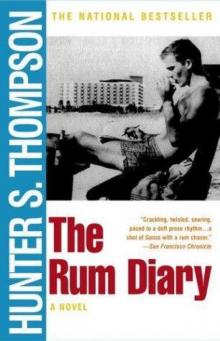 The Rum Diary
The Rum Diary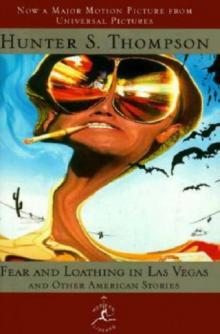 Fear and Loathing in Las Vegas and Other American Stories
Fear and Loathing in Las Vegas and Other American Stories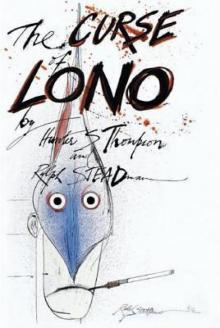 The Curse of Lono
The Curse of Lono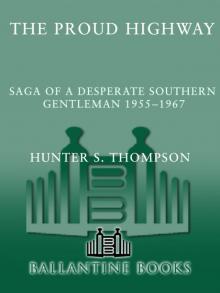 Proud Highway: Saga of a Desperate Southern Gentleman, 1955-1967
Proud Highway: Saga of a Desperate Southern Gentleman, 1955-1967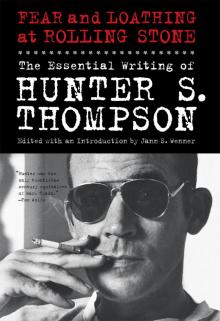 Fear and Loathing at Rolling Stone: The Essential Hunter S. Thompson
Fear and Loathing at Rolling Stone: The Essential Hunter S. Thompson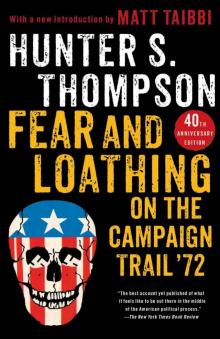 Fear and Loathing on the Campaign Trail '72
Fear and Loathing on the Campaign Trail '72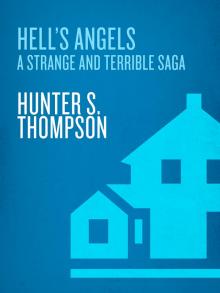 Hell's Angels: A Strange and Terrible Saga
Hell's Angels: A Strange and Terrible Saga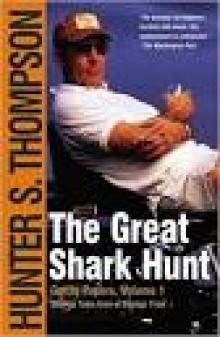 The Great Shark Hunt: Strange Tales From a Strange Time
The Great Shark Hunt: Strange Tales From a Strange Time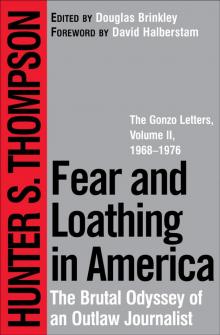 Fear and Loathing in America
Fear and Loathing in America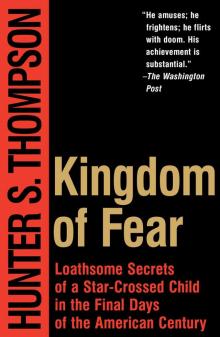 Kingdom of Fear
Kingdom of Fear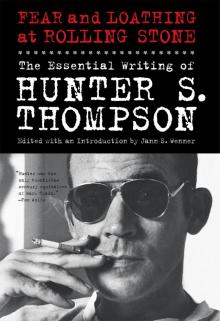 Fear and Loathing at Rolling Stone
Fear and Loathing at Rolling Stone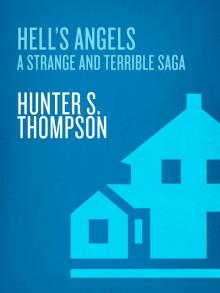 Hell's Angels
Hell's Angels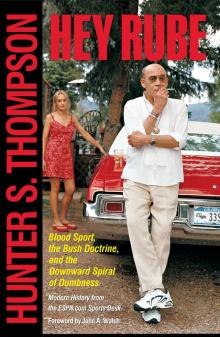 Hey Rube
Hey Rube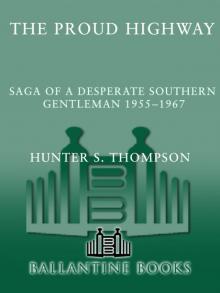 Proud Highway
Proud Highway